- +91 9874182825
- info@allergyandasthmacentre.com
- Clinic : 10:00AM To 06:00 PM
Best Skin Allergy Treatment in Kolkata | Expert Allergists Guide 2023
Welcome to the premier destination for the best skin allergy treatment in Kolkata. If you’re seeking relief from skin allergies, you’ve come to the right place. Our dedicated team of dermatologists and allergists at Allergy & Asthma Treatment Centre is committed to providing you with top-notch care and innovative solutions tailored to your unique needs.Skin allergies can be frustrating and uncomfortable, affecting your quality of life. Whether you’re dealing with eczema, contact dermatitis, hives, or any other skin allergy, our experts are here to help you find relief. We understand that effective treatment begins with accurate diagnosis, so we use cutting-edge diagnostic tools to identify the specific triggers and underlying causes of your skin allergies. Skin allergies, also known as allergic contact dermatitis or contact allergy, are a type of allergic reaction that occurs when the skin comes into contact with a substance that the immune system recognizes as harmful. These substances, known as allergens, can trigger an immune response in some individuals, leading to various skin symptoms and discomfort.Here’s how skin allergies typically work:
Skin allergies, also known as allergic contact dermatitis or contact allergy, are a type of allergic reaction that occurs when the skin comes into contact with a substance that the immune system recognizes as harmful. These substances, known as allergens, can trigger an immune response in some individuals, leading to various skin symptoms and discomfort.Here’s how skin allergies typically work:
Our approach begins with a thorough evaluation to identify the specific triggers and underlying causes of your skin allergies. We understand that each patient is unique, and we tailor our assessments to your individual needs.Personalized Treatment Plans:Once we have pinpointed the allergens or irritants responsible for your skin reactions, we develop personalized treatment plans. These plans may include allergen avoidance strategies, topical or oral medications, and lifestyle modifications to effectively manage and alleviate your symptoms.
What are skin allergies?
 Skin allergies, also known as allergic contact dermatitis or contact allergy, are a type of allergic reaction that occurs when the skin comes into contact with a substance that the immune system recognizes as harmful. These substances, known as allergens, can trigger an immune response in some individuals, leading to various skin symptoms and discomfort.Here’s how skin allergies typically work:
Skin allergies, also known as allergic contact dermatitis or contact allergy, are a type of allergic reaction that occurs when the skin comes into contact with a substance that the immune system recognizes as harmful. These substances, known as allergens, can trigger an immune response in some individuals, leading to various skin symptoms and discomfort.Here’s how skin allergies typically work:- Exposure to Allergen: The person comes into contact with an allergen, which can be a wide range of substances, including certain metals (like nickel), cosmetics, fragrances, plants (like poison ivy), latex, or chemicals.
- Immune Response: In individuals who are sensitive or allergic to a specific allergen, the immune system recognizes it as a threat. The immune system’s response involves the production of antibodies, primarily immunoglobulin E (IgE).
- Inflammatory Reaction: When the skin is exposed to the allergen again, it triggers an inflammatory response. This leads to various skin symptoms, which may include redness, itching, swelling, blistering, or a rash.
Symptoms of skin allergies
Skin allergies can manifest with various symptoms, and the specific symptoms can vary from person to person depending on the allergen involved and the individual’s sensitivity. Common symptoms of skin allergies include:- Redness: Skin affected by an allergy often becomes red or flushed.
- Itching: One of the hallmark symptoms is itching or pruritus, which can be mild to severe and may lead to scratching.
- Rash: Skin allergies frequently result in a rash, which can take various forms, such as:
- Hives (Urticaria): Raised, itchy welts or bumps on the skin that can vary in size and shape.
- Eczema (Dermatitis): Dry, scaly patches of skin that may be red, swollen, or oozing.
- Contact Dermatitis: A localized rash that occurs at the site where the skin came into contact with an allergen. It can be red, blistered, and itchy.
- Swelling: Allergic reactions may cause localized or generalized swelling of the skin. This can lead to puffiness in the affected area.
- Blisters: Some skin allergies can result in the formation of fluid-filled blisters that may burst and ooze.
- Dryness and Peeling: Skin affected by allergies may become dry, flaky, and may peel.
- Burning or Stinging: The affected skin may feel like it’s burning or stinging, causing discomfort.
- Tenderness: The skin in the affected area can become sensitive to touch and may be tender.
- Cracking or Thickening: In chronic cases, skin allergies can lead to thickening or cracking of the skin.
- Secondary Infections: Prolonged scratching or open sores caused by skin allergies can sometimes lead to secondary bacterial or fungal infections.
It’s important to note that the severity and duration of these symptoms can vary. Some skin allergies may resolve on their own once the allergen is removed, while others may require medical treatment, especially if the symptoms are severe or persistent. If you suspect you have a skin allergy, or if you experience severe or worsening symptoms, it’s advisable to consult a healthcare professional or dermatologist for proper diagnosis and guidance on managing and treating the condition.If you suspect you have a skin allergy or are experiencing severe or persistent symptoms, it’s advisable to consult a healthcare professional or dermatologist for proper diagnosis and treatment. They can help identify the specific allergen and provide guidance on managing and preventing skin allergies.

How to identify skin allergies
Identifying skin allergies can be crucial in managing and preventing future reactions. Here are steps to help you identify skin allergies:- Recognize Common Allergens: Start by familiarizing yourself with common allergens that can trigger skin allergies. These may include certain metals (e.g., nickel), cosmetics, fragrances, plants (e.g., poison ivy or poison oak), latex, and various chemicals found in skincare products or cleaning agents.
- Review Your Recent Exposure: Reflect on any recent changes in your environment or products you’ve come into contact with. Consider if you’ve started using new skincare products, detergents, or cosmetics. Identifying a recent change can be a clue to the allergen.
- Observe Symptoms: Pay close attention to any unusual skin symptoms. Common symptoms of skin allergies include redness, itching, rash, hives, swelling, blistering, dryness, and tenderness. Take note of where on your body these symptoms occur and whether they are persistent or recurrent.
- Timeline of Symptoms: Try to establish a timeline of when the symptoms first appeared. This can help you connect the onset of symptoms with a specific allergen exposure.
- Patch Testing: If you suspect a specific substance is causing your skin allergy, consider patch testing. Patch testing involves applying small amounts of potential allergens to your skin under a patch for a period of time to see if a reaction occurs. Patch testing is typically conducted by a dermatologist.
- Elimination Diet for Food Allergies: If you suspect a food allergy is causing skin symptoms (e.g., hives), you may need to undergo an elimination diet. Under the guidance of a healthcare professional, you can temporarily remove specific foods from your diet and reintroduce them one at a time while monitoring for skin reactions.
- Consult a Healthcare Professional: If you are unsure about the cause of your skin allergies or if your symptoms are severe or persistent, it’s advisable to consult a dermatologist or allergist. They can conduct tests, such as skin prick tests or blood tests, to identify specific allergens.
- Keep a Skin Diary: Maintain a record of your skin symptoms, including when they occur, what you were doing or using at the time, and any potential triggers. This diary can be valuable when discussing your condition with a healthcare professional.
- Follow Medical Advice: If a healthcare professional identifies the allergen responsible for your skin allergy, follow their guidance on avoiding the allergen and managing your symptoms. They may recommend medications or other treatments as well.
Types of Skin Allergy
Skin allergies, also known as allergic dermatitis or contact dermatitis, encompass a range of conditions where the skin reacts to allergens or irritants. These reactions can vary in severity and appearance. Here are some common types of skin allergies:- Atopic Dermatitis (Eczema):
- Atopic dermatitis is a chronic condition characterized by red, itchy, and inflamed skin.

- It often appears on the face, hands, and behind the knees. Eczema can be triggered by allergens, such as pollen or certain foods, and irritants like soaps or detergents.
- Atopic dermatitis is a chronic condition characterized by red, itchy, and inflamed skin.
- Contact Dermatitis:
- Contact dermatitis occurs when the skin comes into contact with an allergen or irritant. There are two main types:
- Allergic Contact Dermatitis: This occurs when the skin is exposed to substances like certain metals (e.g., nickel), cosmetics, fragrances, or plants (e.g., poison ivy) to which an individual is allergic.
- Irritant Contact Dermatitis: This type is caused by exposure to irritants like harsh soaps, chemicals, or cleaning agents, which can damage the skin’s protective barrier.
- Contact dermatitis occurs when the skin comes into contact with an allergen or irritant. There are two main types:
- Urticaria (Hives):
- Hives are red, itchy welts or raised bumps on the skin that can appear suddenly and disappear within hours or days. They are often triggered by allergens, medications, or stress.
- Angioedema:
- Angioedema is a related condition to hives, but it affects the deeper layers of the skin. It causes swelling, often around the eyes and lips, and can be triggered by allergens, medications, or unknown causes.
- Allergic Reactions to Insect Bites and Stings:
- Some people experience allergic skin reactions to insect bites and stings, such as those from bees, wasps, or mosquitoes. These reactions can range from localized itching and redness to more severe swelling and hives.

- Drug Allergies:
- Certain medications can trigger allergic skin reactions. These reactions can manifest as rashes, hives, or more severe conditions like Stevens-Johnson syndrome or toxic epidermal necrolysis.
- Food Allergies (Oral Allergy Syndrome):
- In some cases, individuals with food allergies may experience localized allergic reactions around the mouth or on the skin after consuming certain trigger foods. This is known as oral allergy syndrome.

- In some cases, individuals with food allergies may experience localized allergic reactions around the mouth or on the skin after consuming certain trigger foods. This is known as oral allergy syndrome.
- Nummular Dermatitis:
- Nummular dermatitis is characterized by coin-shaped patches of red, scaly, and itchy skin. While the exact cause is unclear, it can be triggered or exacerbated by skin dryness, irritants, or allergens.
- Photoallergic and Phototoxic Reactions:
- Some individuals may develop skin reactions when their skin is exposed to certain allergens or medications and then exposed to sunlight. These reactions can cause redness, itching, and blisters.
- Latex Allergy:
- Latex allergies can lead to skin reactions when individuals come into contact with latex-containing products, such as gloves or medical devices. Symptoms can include itching, redness, and hives.
It’s important to note that allergic skin reactions can vary from person to person and may require different approaches to diagnosis and treatment. If you suspect you have a skin allergy or experience persistent skin symptoms, consult a healthcare professional or dermatologist for proper evaluation and guidance.Causes of Skin allergySkin allergies, also known as allergic dermatitis or contact dermatitis, can be triggered by a wide range of allergens and irritants. These substances can cause an immune response in sensitive individuals, leading to skin reactions. Here are some common causes of skin allergies:
- Allergenic Plants: Contact with plants like poison ivy, poison oak, and poison sumac can cause allergic contact dermatitis. These plants contain urushiol, a substance that triggers skin reactions in many people.
- Metals: Certain metals, especially nickel, can cause allergic reactions when they come into contact with the skin. Nickel is commonly found in jewelry, belt buckles, and clothing fasteners.
- Cosmetics and Fragrances: Some cosmetics, perfumes, and fragrances contain allergenic substances that can cause skin allergies in sensitive individuals.
- Personal Care Products: Skincare and personal care products, including soaps, shampoos, lotions, and sunscreens, may contain allergens or irritants that can lead to contact dermatitis.
- Latex: Latex allergy can cause skin reactions when individuals come into contact with latex-containing products such as gloves, condoms, or balloons.
- Medications: Certain medications can trigger skin allergies, leading to rashes or hives. Common culprits include antibiotics, non-steroidal anti-inflammatory drugs (NSAIDs), and anticonvulsants.
- Insect Bites and Stings: Some people may experience skin allergies in response to insect bites or stings from bees, wasps, mosquitoes, or other insects.
- Food Allergies: While food allergies typically manifest as digestive or respiratory symptoms, some individuals with food allergies may experience skin reactions, such as hives, after consuming trigger foods.
- Chemicals and Cleaning Products: Exposure to chemicals, cleaning agents, or industrial substances can irritate the skin and lead to irritant contact dermatitis or allergic reactions.
- Fabrics: Certain fabrics or clothing materials may contain dyes, finishes, or chemicals that can cause skin irritation or allergies, particularly in individuals with sensitive skin.
- Topical Medications: Some topical medications, including corticosteroids and antibiotics, may cause allergic reactions or contact dermatitis in some individuals.
- Jewelry and Accessories: Besides nickel, other metals or materials used in jewelry, watches, or accessories may cause skin allergies, especially if they contain allergenic substances.
- Sunlight: In rare cases, individuals may experience photoallergic or phototoxic reactions, where their skin reacts to sunlight after exposure to certain allergenic substances or medications.
It’s important to note that not everyone will develop skin allergies in response to these substances. Allergic reactions are often specific to individuals and their sensitivities. If you suspect you have a skin allergy or experience persistent skin symptoms, consult a healthcare professional or dermatologist for proper diagnosis and guidance on managing and preventing future reactions.
Best Skin allergy treatment in Kolkata
The treatment of skin allergies depends on the type and severity of the allergy. Here are common approaches and treatments for various skin allergies:1. Topical Steroids:- Topical corticosteroid creams or ointments are commonly prescribed to reduce inflammation and itching associated with allergic skin conditions like eczema, contact dermatitis, and hives.
- Steroids come in different strengths, and the choice depends on the severity of the condition and the affected area.
- Oral or topical antihistamines can help relieve itching and reduce allergic reactions by blocking the effects of histamine, a chemical released during an allergic response.
- Over-the-counter (OTC) antihistamines may be sufficient for mild allergies, but prescription-strength options are available for more severe cases.
- Using hypoallergenic moisturizers and emollients can help hydrate and soothe dry, irritated skin. These products are particularly important for individuals with conditions like eczema.
- Apply moisturizers immediately after bathing to lock in moisture.
- The primary approach to managing skin allergies is avoiding contact with allergens and irritants. Identify and eliminate triggers from your environment or daily routines to prevent allergic reactions.
- This may involve changing skincare products, avoiding certain foods, or taking steps to reduce exposure to environmental allergens.
- Applying cold, wet compresses to affected areas can help relieve itching and reduce inflammation.
- Barrier creams or ointments can provide a protective layer on the skin, helping to prevent contact with allergens.
- For moderate to severe eczema, medications like topical calcineurin inhibitors (e.g., tacrolimus or pimecrolimus) may be prescribed to control inflammation.
- In cases of severe allergies that do not respond to other treatments, allergen-specific immunotherapy (allergy shots) may be recommended to desensitize the immune system to the allergen gradually.
- In severe cases of skin allergies, oral corticosteroids may be prescribed for a short period to reduce inflammation. However, these medications have potential side effects and are typically used sparingly.
Best skin allergy treatment in Kolkata – Allergy & Asthma treatment centre
At the Allergy & Asthma Treatment Centre in Kolkata, we are dedicated to providing expert care and innovative solutions for individuals struggling with skin allergies. Our experienced team of dermatologists and allergists specializes in diagnosing and treating a wide range of skin allergy conditions, ensuring your skin’s health and comfort. Comprehensive Evaluation:
Comprehensive Evaluation:
Our approach begins with a thorough evaluation to identify the specific triggers and underlying causes of your skin allergies. We understand that each patient is unique, and we tailor our assessments to your individual needs.Personalized Treatment Plans:Once we have pinpointed the allergens or irritants responsible for your skin reactions, we develop personalized treatment plans. These plans may include allergen avoidance strategies, topical or oral medications, and lifestyle modifications to effectively manage and alleviate your symptoms.Cutting-Edge Technology:
Our centre is equipped with state-of-the-art diagnostic tools and treatments to ensure the highest quality of care. We stay at the forefront of medical advancements to provide you with the best possible outcomes.Patient-Centric Care:
Your comfort and well-being are our top priorities. We take the time to listen to your concerns, answer your questions, and involve you in the decision-making process. Our patient-centric approach ensures that you are an active participant in your treatment journey.Compassionate and Experienced Team:
Our team of board-certified dermatologists and allergists brings a wealth of experience and expertise to every case. You can trust us to deliver compassionate and effective care throughout your treatment.Comprehensive Skin Allergy Services:
- Diagnosis and treatment of various skin allergies, including eczema, contact dermatitis, hives, and more.
- Allergy testing, including skin prick testing and patch testing.
- Management of chronic skin conditions, such as psoriasis and vitiligo.
- Evaluation and treatment of skin infections and reactions to insect bites and stings.
- Cosmetic dermatology services for aesthetic concerns.
Skin Allergy Testing in Kolkata
Skin allergy testing is a diagnostic procedure used to identify allergens that may be causing allergic reactions on the skin. There are two primary methods of skin allergy testing: patch testing and skin prick testing. These tests help healthcare providers determine the specific substances or allergens responsible for a patient’s skin allergies.1. Patch Testing:- Patch testing is commonly used to diagnose contact dermatitis, a type of skin allergy caused by contact with allergenic substances.
- The process involves applying small amounts of potential allergens to adhesive patches, which are then placed on the patient’s skin, typically on the back.
- The patches are left in place for a set period, usually 48 hours.
- After this period, the patches are removed, and the healthcare provider evaluates the skin for any allergic reactions, such as redness, itching, or rash.
- The results help identify specific allergens that may be causing the contact dermatitis.
- Skin prick testing is used to identify allergens that trigger conditions like allergic rhinitis, asthma, or immediate hypersensitivity reactions.
- During the test, a healthcare provider places a small drop of a potential allergen extract (e.g., pollen, pet dander, or food) on the patient’s forearm or back.
- A tiny lancet or needle is then used to gently prick or scratch the skin through the drop of allergen extract.
- Within 15-20 minutes, the healthcare provider assesses the skin for any visible allergic reactions, such as redness and raised wheals (hives).
- The size of the wheel and its reaction provide information about the patient’s sensitivity to the allergen.
- Inform your healthcare provider about any medications you are taking, as some medications can interfere with test results.
- Stop using topical corticosteroids or antihistamines for a specified period before the test, as these can affect the skin’s reaction.
- During the test, you may experience mild itching or discomfort at the test sites, but severe reactions are rare.
- It’s important to stay at the testing facility for the required observation time to monitor any delayed reactions.
- Skin allergy testing should only be performed by trained healthcare professionals, such as allergists or dermatologists.
Skin Allergy Testing Cost in Kolkata
The cost of skin allergy testing in Kolkata, or anywhere else, can vary significantly depending on several factors. These factors include the type of test, the number of allergens being tested, the healthcare facility or clinic where the testing is conducted, and whether insurance coverage is applicable.Here are some general guidelines on the approximate costs of common skin allergy tests in Kolkata:- Skin Prick Testing (SPT):
- The cost of SPT can range from INR 500 to INR 2,000 or more, depending on the number of allergens being tested and the healthcare provider’s fees.
- Some hospitals and clinics may offer packages for multiple allergens or comprehensive allergy panels at different price points.
- Patch Testing:
- Patch testing for contact dermatitis typically costs between INR 1,000 to INR 3,000 or more, depending on the number of allergens being tested and the facility’s charges.
- Consultation Fees:
- In addition to the cost of the actual testing, there may be consultation fees for seeing an allergist or dermatologist. These fees can vary widely, depending on the healthcare provider and the complexity of your case.
- Health Insurance Coverage:
- If you have health insurance, it’s advisable to check with your insurance provider to see if skin allergy testing is covered under your plan. Coverage can vary significantly from one insurance plan to another.
- Government Hospitals and Clinics:
- Some government hospitals and clinics in Kolkata may offer skin allergy testing services at a lower cost or even free of charge, depending on your income and eligibility.
- Specialized Allergy Clinics:
- Private allergy clinics or specialized allergy centers may offer comprehensive testing services but may charge higher fees for their expertise and advanced testing options.
Best Skin Allergy Treatment Centres in Kolkata
Here are some well-known skin allergy treatment centers in Kolkata:Allergy & Asthma Treatment Centre:- The Allergy & Asthma Treatment Centre in Kolkata specializes in the diagnosis and treatment of skin allergies. Their team of experts offers personalized care and advanced diagnostic techniques
- AMRI Hospitals is a leading healthcare institution in Kolkata with a dedicated dermatology department. They offer a wide range of skin allergy treatments, including diagnostic tests and personalized care plans.
- Ruby General Hospital in Kolkata has a dermatology department that specializes in skin allergy diagnosis and treatment. They provide services for various skin conditions and have experienced dermatologists.
- Fortis Hospital in Kolkata offers dermatology and allergy services, including skin allergy testing and treatment. Their team of dermatologists and allergists provides comprehensive care for patients with skin allergies.
- Apollo Gleneagles Hospital is a renowned healthcare facility in Kolkata offering comprehensive dermatology and allergy services. Their team of experienced dermatologists and allergists provides advanced treatment for various skin allergy conditions.
- Belle Vue Clinic has a dermatology department that provides skin allergy diagnosis and treatment services. They have experienced dermatologists and a reputation for high-quality healthcare.
- Charring Cross Nursing Home in Kolkata offers dermatology services, including the diagnosis and treatment of skin allergies. Their experienced medical team caters to patients with various skin conditions.
- Peerless Hospital in Kolkata has a dermatology and allergy department that offers comprehensive skin allergy treatment. They provide services for patients with a wide range of skin allergy concerns.
Pros and cons of allergy testing
Allergy testing can provide valuable information about a person’s allergic sensitivities, helping healthcare providers and individuals develop strategies to manage and prevent allergic reactions. However, like any medical procedure, allergy testing has its pros and cons.Pros of Allergy Testing:
- Identification of Allergens: Allergy testing helps identify specific allergens or triggers that cause allergic reactions. This information is crucial for developing targeted treatment and avoidance strategies.
- Customized Treatment: Knowing the specific allergens allows healthcare providers to tailor treatment plans to the individual. This can include allergen avoidance, medication prescriptions, or immunotherapy (allergy shots).
- Symptom Control: Allergy testing can lead to improved symptom control, reducing the frequency and severity of allergic reactions. This can significantly enhance an individual’s quality of life.
- Preventative Measures: Armed with information from allergy testing, individuals can take proactive steps to minimize allergen exposure, reducing the risk of allergic reactions.
- Peace of Mind: Allergy testing can provide peace of mind by confirming or ruling out suspected allergies. It can help individuals understand the cause of their symptoms.
Cons of Allergy Testing:
- Cost: Allergy testing can be costly, and the expense may not be fully covered by insurance. The cost can vary depending on the type of test and the number of allergens being tested.
- Discomfort: Some allergy tests, such as skin prick testing, may cause mild discomfort or itching during the procedure.
- False Positives and Negatives: Allergy tests are not always 100% accurate. False positives (indicating allergies that don’t exist) and false negatives (missing true allergies) can occur.
- Interpretation Challenges: Interpreting allergy test results can be complex. A positive result does not necessarily mean an individual will have symptoms upon exposure to the allergen. Clinical correlation with symptoms is essential.
- Risk of Anaphylaxis: In some cases, skin prick testing can trigger severe allergic reactions (anaphylaxis) in highly sensitive individuals. Therefore, this test must be conducted by trained healthcare professionals who can respond to emergencies.
- Limited Testing Window: Some allergy tests, like skin prick testing, may only detect immediate-type allergies, while delayed-type allergies or sensitivities may not be identified.
- Potential Overdiagnosis: Allergy testing may lead to overdiagnosis and overtreatment of allergies, as not all positive test results correspond to clinically significant allergies.
- Avoidance Challenges: Learning about allergies may necessitate significant lifestyle changes, such as altering one’s diet, avoiding specific environments, or eliminating pets or allergenic materials from the home.
Natural remedies for skin allergies
Natural remedies can complement conventional treatments for skin allergies or provide relief for mild cases. Keep in mind that these remedies may not work for everyone, and it’s essential to consult with a healthcare provider for appropriate guidance and diagnosis. Here are some natural remedies for skin allergies:- Cold Compress:
- Applying a cold compress or ice pack to the affected area can help reduce itching and inflammation associated with skin allergies.
- Aloe Vera:
- Aloe vera gel, when applied topically, can soothe and moisturize irritated skin. It has anti-inflammatory and healing properties.
- Oatmeal Baths:
- Adding colloidal oatmeal to a warm bath can help relieve itching and soothe irritated skin. Soak for 15-20 minutes, then gently pat your skin dry.
- Chamomile Tea:
- Chamomile has anti-inflammatory and anti-itch properties. Brew chamomile tea, let it cool, and then apply it to the affected area with a clean cloth or cotton ball.
- Coconut Oil:
- Coconut oil has moisturizing and anti-inflammatory properties. Apply a thin layer of organic, extra-virgin coconut oil to the affected skin.
- Calendula Cream:
- Calendula, also known as marigold, has soothing and anti-inflammatory properties. Apply calendula cream to the affected area as directed.
- Honey:
- Raw honey has antibacterial and anti-inflammatory properties. Apply a thin layer of honey to the affected area and leave it on for about 20 minutes before rinsing.
- Apple Cider Vinegar (ACV):
- Dilute ACV with water (1:1) and apply it to the affected skin using a cotton ball. ACV may help relieve itching and reduce inflammation.
- Baking Soda Paste:
- Mix baking soda with water to create a paste and apply it to the itchy area. Leave it on for a short time and rinse off with cool water.
- Tea Tree Oil (Diluted):
- Tea tree oil has antimicrobial properties. Dilute a few drops of tea tree oil in a carrier oil (such as coconut or olive oil) and apply it to the affected area. Note that some individuals may be sensitive to tea tree oil, so a patch test is recommended.
- Witch Hazel:
- Witch hazel is a natural astringent that can help reduce itching and inflammation. Apply witch hazel to the affected area using a cotton ball.
- Probiotics:
- Consuming probiotics (live cultures of beneficial bacteria) through yogurt or supplements may help improve gut health, which can influence skin health and allergies.
- Omega-3 Fatty Acids:
- Consuming foods rich in omega-3 fatty acids, such as fatty fish, flaxseeds, and walnuts, may help reduce inflammation and improve skin health.
- Hydration and Diet:
- Staying hydrated and maintaining a balanced diet rich in fruits, vegetables, and antioxidants can support overall skin health and may reduce the risk of skin allergies.




 Comprehensive Evaluation:
Comprehensive Evaluation: